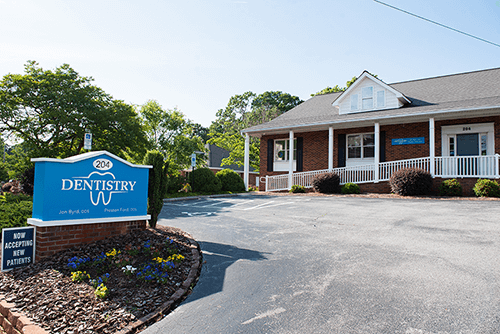Dental Implants
Dental implants offer a reliable solution for tooth replacement, whether you've lost one or multiple teeth. They provide a permanent and natural-looking solution that functions normally.
Dental Implants in
High Point, NC
Dental implants are an excellent option for replacing missing teeth. They are typically made of titanium and placed beneath the gumline. Over several months, the bone surrounding the implant will grow and fuse with the implant, anchoring it securely in place. This allows the implant to serve as a replacement for the missing tooth’s root system. Once the implant is securely in place, an artificial tooth can be attached to the implant using a small metal connector known as an abutment.
Patients from across the Triad area, including Greensboro and Winston-Salem, trust our dental implants. Call our office today to schedule a consultation if you’re missing one or more teeth and looking for a permanent restoration!
-
What is the procedure for dental implants?
- Initial Consultation – We will visually examine your mouth, take a 3D image, and discuss the various implant options. We will work with you to develop an implant surgery and restoration plan. At this appointment, we will determine whether bone grafting is needed before or during implant placement. If bone grafting is needed beforehand, this will be accomplished before moving to step two.
- Implant Placement – The dental implant will be surgically placed into the jawbone where the tooth is missing. Each patient is different and unique, but most people experience much less discomfort than expected and typically return to work the day after surgery. Local anesthesia is often used, but many people also opt to use IV sedation. Post-implant discomfort is similar to other dental surgery. You may have some minor swelling, bruising, and/or pain. Almost all patients manage any pain with over-the-counter medications.
- Healing Period – As you heal, the implant fuses to the jawbone in osseointegration. This can take up to several months. You will be on a soft diet during the initial healing.
- Abutment and Crown Placement – Once the implant is fully fused to the bone, we attach the connector piece, called the abutment, and the custom-made crown, which is made to blend with your remaining natural teeth.
- Periodic Checkups – After the dental implant process, you’ll visit us regularly for follow-up checkups. Although implants don’t decay, they still need routine care, checkups, and cleanings.
If you have questions, give us a call today!
Call High Point Dental Partners -
Who can benefit from implants?
Dental implants are a popular and effective solution for replacing missing or severely damaged teeth, offering benefits to a wide range of patients:
- Adults with Missing Teeth: Dental implants are ideal for individuals who have lost one or more teeth due to decay, gum disease, or injury.
- People with Good Oral Health: Ideal candidates have healthy gums and sufficient bone density to support the implant. Those with conditions like uncontrolled diabetes or heavy smoking may need to be evaluated more carefully, as these conditions can affect the healing process.
- Those Unhappy with Dentures or Bridges: Individuals who find dentures uncomfortable or inconvenient or have bridge issues might find dental implants more stable and comfortable.
- Patients Seeking a Permanent Solution: Unlike removable dentures, dental implants provide a permanent solution that can last a lifetime with proper care.
- People with Jawbone Loss: While significant jawbone loss was once a disqualifier, advancements in bone grafting techniques now allow those with an insufficient bone to receive implants potentially.
- Individuals Looking for Natural-Looking Results: Dental implants are designed to look, feel, and function like natural teeth, offering aesthetic and functional benefits.
- Patients Able to Undergo Minor Surgery: Getting dental implants involves minor surgical procedures, so candidates need to be in good general health and able to heal properly.
Each case is unique, so consulting with us is the best way to determine if dental implants are the right choice for an individual’s specific dental needs and health conditions.
-
Why get a dental implant opposed to alternatives (such as a bridge or removable partial)?
Dental implants offer several advantages over alternative tooth replacement options such as bridges or removable dentures. They feel, fit, look, and function like natural teeth; you don’t need to remove them to clean them. You can clean your implants just like your natural teeth. Implants help maintain your smile’s natural shape and facial structure and can last for many decades with proper care. On the other hand, the alternatives have much shorter average lifespans, and replacing or repairing them multiple times can be expensive and time-consuming. Therefore, in the long run, implants can save you money and time in the dental chair.
-
What if I've been told I am not a candidate for dental implants because I don't have enough bone?
Dental implants require a certain amount of bone height, width, density, and health. If you do not currently have sufficient bone available because of trauma or missing teeth for a long period, we may be able to use advanced bone grafting techniques to restore the jawbone and place implants for you.
Call us today for a consultation! -
What is a full arch implant treatment?
There are a couple of options for full arch implant treatments.
- Ball Attachment Overdenture: The first option is “overdenture.” This is where two or four implants are placed on your lower jaw, and a denture “snaps in” to these implants.
- Bar Overdenture: The second option, known as a “bar overdenture, ” involves placing four to six implants into your upper or lower jaw. The implants are connected to a support bar, and your denture will attach to the support bar with clips.
- Fixed Denture (Screwed In Place): A third option involves placing enough implants in the upper or lower jawbone to support a fixed bridge. The full arch bridge is screwed into the implants, so they can only be taken out in our office for maintenance visits.
- Individual Crowns and Bridges: This is the most natural-looking, functioning, and feeling complete arch implant restoration. It typically requires at least eight or more implants, and the restorations are placed in segments.
Questions About Dental Implants?
If you're interested in dental implants or have any questions—contact us today.

